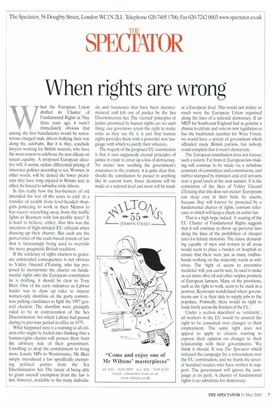When rights are wron
Nvhen the European Union drafted its Charter of Fundamental Rights at Nice three years ago, it wasn't immediately obvious that among the first beneficiaries would be testosterone-charged male drivers bullying their way along the autobahn. But it is they, conclude lawyers working for British insurers, who have the most reason to celebrate the new diktats on sexual equality. A proposed European directive will, it seems, outlaw differential pricing of insurance policies according to sex. Women, in other words, will be denied the lower premiums they have long enjoyed in Britain and, in effect, be forced to subsidise male drivers.
Is this really how the bra-burners of old intended the war of the sexes to end: in a transfer of wealth from level-headed shopgirls pottering to work in their Metros to boy-racers screeching away from the traffic lights in Beamers with low-profile tyres? It is hard to believe, either, that this was the intention of high-minded EU officials when drawing up their charter. But such are the perversities of the code-based system of law that is increasingly being used to override the more pragmatic British tradition.
If the tendency of rights charters to generate unintended consequences is not obvious to Valery Giscard d'Estaing, who has proposed to incorporate the charter on fundamental rights into the European constitution he is drafting, it should be clear to Tony Blair. One of his early initiatives as Labour leader was to draw up rules to impose women-only shortlists on the party committees picking candidates to fight the 1997 general election. The shortlists were promptly ruled to be in contravention of the Sex Discrimination Act which Labour had passed during its previous period in office in 1975.
What happened next is a warning to all citizens who might be fooled into thinking that a human-rights charter will protect them from the arbitrary rule of their government. Unwilling to drop his commitment to bring more female MPs to Westminster, Mr Blair simply introduced a law specifically exempting political parties from the Sex Discrimination Act. The luxury of being able to grant oneself exemption from the law is not, however, available to the many individu als and businesses that have been inconvenienced and left out of pocket by the Sex Discrimination Act. The 'eternal' principles of justice promised by human rights are no such thing: our governors retain the right to make rules as they see fit; it is just that human rights provides them with a powerful new language with which to justify their wheezes.
The tragedy of the proposed EU constitution is that it uses supposedly eternal principles of justice in order to cover up a loss of democracy. No matter how soothing the government's assurances to the contrary, it is quite clear that, should the constitution be passed in anything like its current form, fewer decisions will be made at a national level and more will be made
at a European level. This would not matter so much were the European Union organised along the lines of a national democracy. If an MEP for South-east England had as genuine a chance to debate and vote on new legislation as has the backbench member for Wyre Forest, we would have a system of government which offended many British patriots, but nobody could complain that it wasn't democratic.
The European constitution does not foresee such a system. Far from it; European law-making will continue to be made via a nebulous construct of committees and commissions, and rubber-stamped by ministers and civil servants over a good lunch at the next summit. It is the contention of the likes of Valery Giscard d'Estaing that this does not matter: Europeans can sleep easy in their beds, he asserts, because they will forever be protected by a fundamental charter of rights, constant reference to which will keep a check on unfair law.
That is a high hope indeed. A reading of the EU Charter of Fundamental Rights suggests that it will continue to throw up perverse laws along the lines of the prohibition of cheaper rates for female motorists. The clause demanding equality of men and women in all areas would seem to place a burden on hospitals to ensure that there were just as many midhusbands working on the maternity wards as widwives. The 'right of access to preventive medicine' will, you can be sure, be used to make us eat more olive oil and other surplus products of European farmers. Many of the provisions, such as the right to work, seem to be stuck in a postwar, Keynesian wonderland where governments saw it as their duty to supply jobs to the populace. Pointedly, there would no right to trade freely across the borders of the EU.
Under a section described as 'solidarity', all workers in the EU would be assured the right to be consulted over changes to their employment. The same right does not appear to apply to citizens wanting to express their opinion on changes to their relationship with their governments. We think it should. It was The Spectator which initiated the campaign for a referendum over the EU constitution, and we thank the several hundred readers who have written in support. The government will ignore the campaign at its peril. A charter of fundamental rights is no substitute for democracy.


































































 Previous page
Previous page